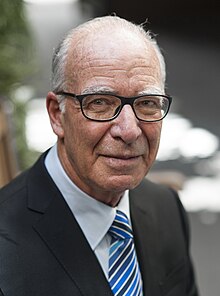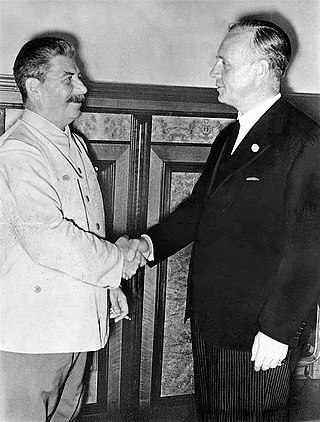
The Molotov–Ribbentrop Pact, officially the Treaty of Non-Aggression between Germany and the Union of Soviet Socialist Republics, and also known as the Hitler–Stalin Pact and the Nazi–Soviet Pact, was a non-aggression pact between Nazi Germany and the Soviet Union, with a secret protocol establishing Soviet and German spheres of influence across Northern Europe. The pact was signed in Moscow on 24 August 1939 by Soviet Foreign Minister Vyacheslav Molotov and German Foreign Minister Joachim von Ribbentrop.
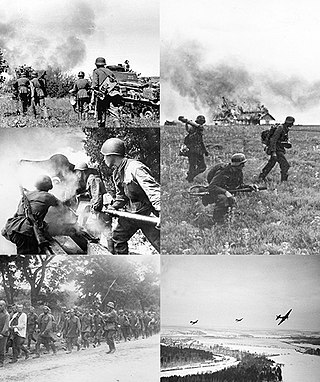
Operation Barbarossa was the invasion of the Soviet Union by Nazi Germany and many of its Axis allies, starting on Sunday, 22 June 1941, during World War II. It was the largest and costliest land offensive in human history, with around 10 million combatants taking part, and over 8 million casualties by the end of the operation.

Sir Richard Stafford Cripps was a British Labour Party politician, barrister, and diplomat.
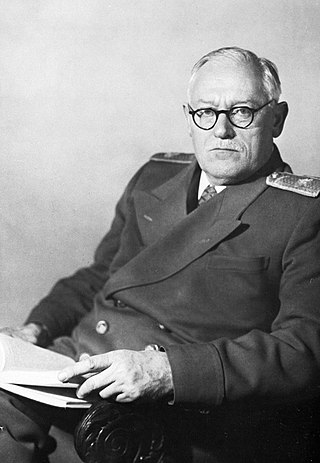
Andrey Yanuaryevich Vyshinsky was a Soviet politician, jurist and diplomat.
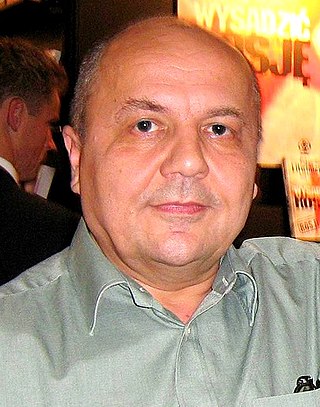
Vladimir Bogdanovich Rezun, known by his pseudonym of Viktor Suvorov, is a former Soviet GRU officer who is the author of non-fiction books about World War II, the GRU and the Soviet Army, as well as fictional books about the same and related subjects.

Icebreaker: Who Started the Second World War? is a military history book by the Russian non-fiction author Viktor Suvorov, published in 1989. Suvorov argued that Joseph Stalin planned a conquest of Europe for many years, and was preparing to launch a surprise attack on Nazi Germany at the end of summer of 1941 to begin that plan. He says that Operation Barbarossa was a pre-emptive strike by Adolf Hitler, a claim which the Nazi leader himself had made at the time. Since the 1990s and the dissolution of the Soviet Union, this theory has received some support among historians in some post-Soviet and Central European states, but some Western scholars have criticized his conclusions for lack of evidence and documentation.

German–Soviet Union relations date to the aftermath of the First World War. The Treaty of Brest-Litovsk, dictated by Germany ended hostilities between Russia and Germany; it was signed on March 3, 1918. A few months later, the German ambassador to Moscow, Wilhelm von Mirbach, was shot dead by Russian Left Socialist-Revolutionaries in an attempt to incite a new war between Russia and Germany. The entire Soviet embassy under Adolph Joffe was deported from Germany on November 6, 1918, for their active support of the German Revolution. Karl Radek also illegally supported communist subversive activities in Weimar Germany in 1919.
The German–Soviet Credit Agreement was an economic arrangement between Nazi Germany and the Soviet Union whereby the latter received an acceptance credit of 200 million ℛ︁ℳ︁ over seven years with an effective interest rate of 4.5 percent. The credit line was to be used during the next two years for purchase of capital goods in Germany and was to be paid off by means of Soviet material shipment from 1946 onwards. The economic agreement was the first step toward improvement in relations between the Soviet Union and Germany.
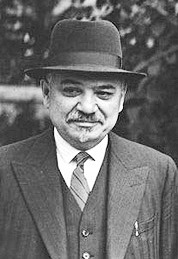
Ivan Mikhailovich Maisky was a Soviet diplomat, historian and politician who served as the Soviet Union's ambassador to the United Kingdom from 1932 to 1943, including much of the period of the Second World War.

Wolfgang Leonhard was a German political author and historian of the Soviet Union, the German Democratic Republic and Communism. A German Communist whose family had fled Hitler's Germany and who was educated in the Soviet Union, after World War II Leonhard became one of the founders and leaders of the German Democratic Republic until he became disillusioned and fled in 1949, first defecting to Yugoslavia and then moving to West Germany in 1950 and later to the United Kingdom. In 1956 he moved to the United States, where he was a popular and influential professor at Yale University from 1966 to 1987, teaching the history of communism and the Soviet Union, topics about which he wrote several books. After the Cold War ended, he returned to Germany.
The accusation that Joseph Stalin was antisemitic is much discussed by historians. Although part of a movement that included Jews and rejected antisemitism, he privately displayed a contemptuous attitude toward Jews on various occasions that were witnessed by his contemporaries, and are documented by historical sources. Stalin argued that the Jews possessed a national character but were not a nation and were thus unassimilable. He argued that Jewish nationalism, particularly Zionism, was hostile to socialism. In 1939, he reversed communist policy and began a cooperation with Nazi Germany that included the removal of high-profile Jews from the Kremlin. As dictator of the Soviet Union, he promoted repressive policies that conspicuously impacted Jews shortly after World War II, especially during the anti-cosmopolitan campaign. At the time of his death, Stalin was planning an even larger campaign against Jews, which included the deportation of all Jews within the Soviet Union to Northern Kazakhstan. According to his successor Nikita Khrushchev, Stalin was fomenting the doctors' plot as a pretext for further anti-Jewish repressions.

The Anglo-Soviet Agreement was a declaration signed by the United Kingdom and the Soviet Union on 12 July 1941, shortly after the beginning of Operation Barbarossa, the German invasion of the Soviet Union. In the agreement, the UK and the Soviet Union pledged to cooperate in the war against Nazi Germany and not to make a separate peace with Germany.
The German–Soviet Border and Commercial Agreement, signed on January 10, 1941, was a broad agreement which settled border disputes, and continued raw materials and war machine trade between the Soviet Union and Nazi Germany. The agreement continued the countries' relationship that started in 1939 with the Molotov–Ribbentrop Pact, which contained secret protocols that divided Eastern Europe between the Soviet Union and Germany. The relationship had continued with the subsequent invasions by Germany and the Soviet Union of that territory. The agreement contained additional secret protocols, settling a dispute regarding land in Lithuania, which had been split between both countries. The agreement continued the German–Soviet economic relations that had been expanded by the 1939 German–Soviet Commercial Agreement and the more comprehensive 1940 German–Soviet Commercial Agreement.

The Molotov–Ribbentrop Pact was an August 23, 1939, agreement between the Soviet Union and Nazi Germany colloquially named after Soviet foreign minister Vyacheslav Molotov and German foreign minister Joachim von Ribbentrop. The treaty renounced warfare between the two countries. In addition to stipulations of non-aggression, the treaty included a secret protocol dividing several eastern European countries between the parties.

After the Nazis rose to power in Germany in 1933, relations between Nazi Germany and the Soviet Union began to deteriorate rapidly. Trade between the two sides decreased. Following several years of high tension and rivalry, the two governments began to improve relations in 1939. In August of that year, the countries expanded their economic relationship by entering into a Trade and Credit agreement whereby the Soviet Union sent critical raw materials to Germany in exchange for weapons, military technology and civilian machinery. That deal accompanied the Molotov–Ribbentrop Pact, which contained secret protocols dividing central Europe between them, after which both Nazi forces and Soviet forces invaded territories listed within their "spheres of influence".

German–Soviet Axis talks occurred in October and November 1940, nominally concerning the Soviet Union's potential adherent as a fourth Axis power during World War II among other potential agreements. The negotiations, which occurred during the era of the Molotov–Ribbentrop Pact, included a two-day conference in Berlin between Soviet Foreign Minister Vyacheslav Molotov, Adolf Hitler and German Foreign Minister Joachim von Ribbentrop. While Ribbentrop and most of the German Foreign office wanted an alliance with the Soviet Union, Hitler had been planning to invade the Soviet Union. In early June 1940 as the Battle of France was still ongoing, Hitler reportedly told Lt. General Georg von Sodenstern that the victories against the Allies had “finally freed his hands for his important real task: the showdown with Bolshevism." Ribbentrop nevertheless convinced Hitler to allow diplomatic overtures, with his own hope being for an alliance. Ribbentrop and Benito Mussolini had already speculated at the idea of offering the Soviet Union a free hand in a southern direction. Ribbentrop's approach in general to foreign policy was different from Hitler's: he favored an alliance with the Soviet Union, while Hitler had wanted to pressure Britain into an alliance and pushing for "Lebensraum" in the east.

After the Munich Agreement, the Soviet Union pursued a rapprochement with Nazi Germany. On 23 August 1939, the Soviet Union signed a non-aggression pact with Germany which included a secret protocol that divided Eastern Europe into German and Soviet spheres of influence, anticipating potential "territorial and political rearrangements" of these countries. Germany invaded Poland on 1 September 1939, starting World War II. The Soviets invaded eastern Poland on 17 September. Following the Winter War with Finland, the Soviets were ceded territories by Finland. This was followed by annexations of the Baltic states and parts of Romania.

The Soviet offensive plans controversy was a debate among historians in the late 20th and early 21st centuries as to whether Joseph Stalin had planned to launch an attack against Nazi Germany in the summer of 1941. The controversy began with Soviet defector Viktor Suvorov with his 1988 book Icebreaker: Who started the Second World War? In it, he claimed that Stalin used Nazi Germany as a proxy to attack Europe.
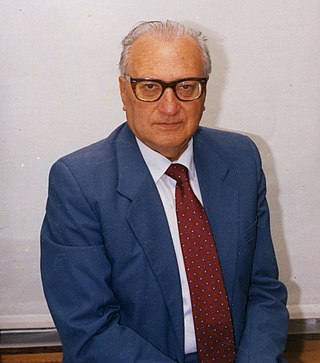
Yosef Govrin was an Israeli diplomat who served in Israel's Foreign Service between 1953 and 1995.
This is a select bibliography of English language books and journal articles about the Soviet Union during the Second World War, the period leading up to the war, and the immediate aftermath. For works on Stalinism and the history of the Soviet Union during the Stalin era, please see Bibliography of Stalinism and the Soviet Union. Book entries may have references to reviews published in English language academic journals or major newspapers when these could be considered helpful.
